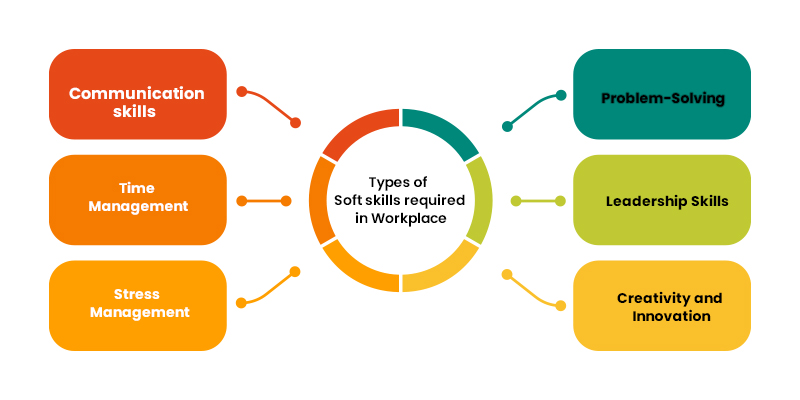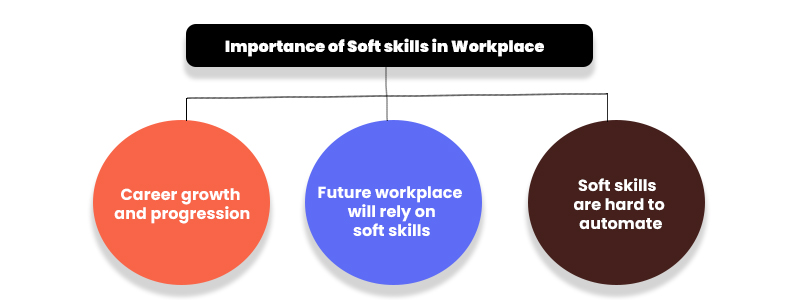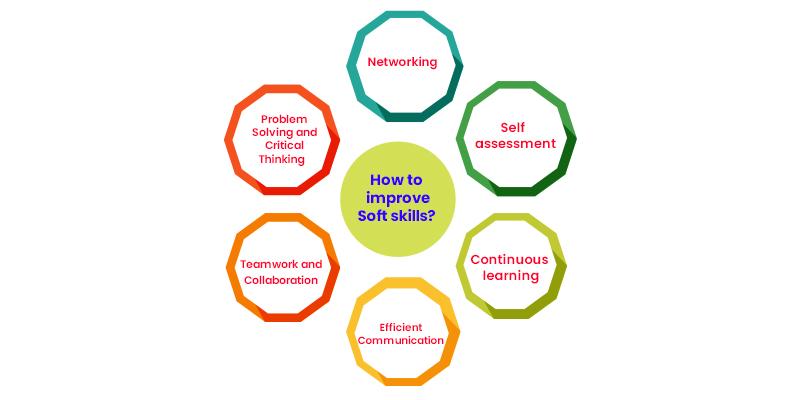In today’s Professional world, Soft skills are a very demanding skill for freshers jobs seeking candidates. Soft skills have emerged as a vital factor in determining the success and effectiveness of newcomers in the IT sector.
While technical skills serve as the foundation, it’s the soft skills that truly empower these freshers to sustain themselves in an industry that involves constant innovation, collaboration, and diverse interactions. In this blog, we will delve into what soft skills, their importance, types, benefits, and tips for how to improve them.
What are Soft skills?
Soft skills are interpersonal skills that characterize how a person interacts and makes relationships with others. In a professional environment, soft skills are considered to be a complement for the candidate apart from their technical skills. Soft skills involve how well a person interacts with other people and defines a person’s character traits. While hiring, employers expect for the candidate to possess balance in both soft skills as well as hard skills.
Types of Soft skills required in Workplace
Listed below are the types of skills required for the workplace.
- Communication skills: Good communication skills are considered to be the core of successful workplace interaction. This not only involves speaking and sharing ideas, but also involves listening, written communication skills, and adapting the style of communication based on the audience.
- Teamwork and Collaboration: The ability of working with colleagues from various backgrounds, contributing to team goals, sharing ideas, and resolving conflicts is important for achieving collective success.
- Problem-Solving: Getting adapted to challenges and finding innovative solutions is a highly valued skill. This involves critical thinking, analyzing situations, and making informed decisions.
- Adaptability: The modern work environment will undergo rapid changes. Being open to new ideas, technologies, and approaches and being able to adjust and learn quickly is an essential skill.
- Time Management: Effectively managing tasks, setting priorities, and meeting deadlines is a key factor for maintaining increased productivity and achieving professional goals.
- Leadership Skills: Even for non-managerial roles, leadership skills such as taking initiative, motivating others, and leading by example are valuable for driving projects and influencing outcomes.
- Emotional Intelligence: Soft skills development is important for understanding and managing one’s own emotions as well as sharing the emotions of others contributes to healthy working relationships and effective collaboration.
- Conflict Resolution: The ability to address conflicts constructively, seek compromise, and maintain positive working relationships even during disagreements is vital.
- Negotiation Skills: Whether it’s for project scope, salary, or resources, negotiation skills help in achieving mutually beneficial outcomes without straining relationships.
- Stress Management: The capacity to handle pressure, maintain focus, and manage stress positively contributes to consistent performance, healthy well-being and increase in overall productivity.
- Networking and Relationship Building: Building and making professional relationships both within and outside the organization can lead to new job opportunities, information sharing, and a supportive professional network.
- Creativity and Innovation: Thinking outside the box, suggesting new ideas, and contributing innovative solutions lead to organizational growth and competitiveness.
- Presentation Skills: Effectively conveying information, whether to a small team or a larger audience, is important for sharing insights and ideas.
- Cultural Sensitivity: In diverse workplaces, being respectful and aware of cultural differences promotes an inclusive environment and effective collaboration.
- Customer Service Orientation: Regardless of the role, understanding and meeting the needs of internal or external customers is essential for overall productivity and organizational success.
Importance of Soft skills in Workplace
Listed below are the importance of soft skills in the workplace.
- Career growth and progression: Soft skills determine your character traits and how well you interact and make relationships with others. When two candidates have the same hard skills, then the hiring manager will make decisions based on their soft skills.
- Future workplace will rely on soft skills: Soft skills are the key differentiator in the workplace. Skills such as teamwork, communication,problem-solving, decision making, and critical thinking will be more important than ever. Your soft skills make you stand out from other candidates.
- Soft skills are hard to automate: Even though Artificial intelligence and Robotics have been developed beyond our expectation, soft skills like emotional intelligence are difficult to automate and are not likely to become automated anytime soon. This means they’re expected to become more desirable in the future.
Soft skills are the foundation for effective teamwork, leadership, communication, and personal growth. They complement technical skills and contribute to a well-rounded and successful professional. As the workplace continues to evolve, soft skills will remain a key differentiator in achieving success and maintaining a competitive edge.
How to improve Soft skills?
Unlike hard skills, Soft skills are related to emotions and understanding that allow people to determine one’s character. Listed below are the tips for how to improve soft skills.
- Self-assessment: Start by analyzing which type of soft skills you want to improve. Analyze your strengths and weaknesses based on that.
- Set goals: Setting specific goals for the soft skills you want to improve will help you stay focused and see visible progress.
- Continuous learning: Soft skills are all about how consistent and hard you are trying to learn. There are a lot of skills that can help you improve your soft skills like reading books, taking online courses, attending workshops and webinars related to the specific soft skills you want to improve.
- Regular practice: Always engage in regular practice based on the specific soft skills you want to enhance. For example, if you are learning to develop communication skills, engage in a conversation and evaluate yourself.
- Observe from inspiration: Observe people who are known for their soft skills and compare yourself with them. This will help you analyze yourself and help you to take necessary steps to improve your skills furthermore.
- Efficient Communication: Improve your clarity of speech, practice active listening, and adjust your communication style according to the listeners. Engage yourself in all sorts of presentations, discussions, and written communications exercises.
- Teamwork and Collaboration: Join organizations and clubs to socialize with people, Participate in group projects, and engage in team-building activities to improve your ability to work well with others.
- Problem-Solving and Critical Thinking: Regularly tackling puzzles, answering brain teasers, and solving real-world challenges will enhance your ability to analyze situations and find creative solutions.
- Time Management: Prioritize tasks, set realistic and fixed deadlines, use tools like to-do lists or time management apps and set goals to stay organized and meet deadlines.
- Stress Management: Practice relaxation techniques are a very important aspect in soft skills development like deep breathing, meditation, physical exercise, or simply reading your favorite book to manage stress effectively.
- Emotional Intelligence: Develop self-awareness by understanding and analyzing your emotions and reactions. Put yourself in others’ shoes to gain a better understanding of their feelings.
- Role-Playing: Simulate scenarios that require specific soft skills, such as negotiation or conflict resolution. Role-playing helps you practice different types of approaches and responses.
- Networking: Attending industry events, workshops, and seminars to connect with professionals in your field. Engaging in conversations with others will improve your networking and relationship-building skills.
- Feedback Incorporation: Actively apply feedback you receive in real-life situations. This demonstrates your commitment and improvement and allows you to refine your skills.
- Stay Open to Learning: Soft skills are not one-size-fits-all; they evolve as you encounter new experiences. Staying open to learning and adapting your skills as needed is very essential.
- Journaling: Maintain a journal to track your progress, reflect on your experiences, and note situations where you applied your improved soft skills effectively.
Benefits of Soft skills in workplace
Listed below are some benefits of soft skills in the workplace.
- Increases Productivity: Improving your soft skills can help a candidate become more productive at work. Learning communication skills can help them listen better and ask more thorough questions. Improving your listening skills can help you understand others better. This can help you complete your tasks more efficiently and quickly.
- Enhances retention rates: Candidates who have soft skills are less likely to leave their job because they are more invested in the company’s success. The soft skill of active listening can help you communicate effectively with your colleagues. This can help you solve conflicts and develop a healthy working relationship, which improves retention rates for the company. If you work in HR, developing a retention plan is important to your success. If you work in a role outside of HR, working in a company with high retention rates may mean it has a positive work environment.
- Boosts self-confidence: Improving your soft skills will help you feel more confident in your role. For instance, team building classes can help you and your team build trust with one another. As a result, your confidence in your ability to perform well in an organization will be increased.
- Improved job satisfaction: Soft skills training will help you become more effective and happy at work, which can turn into higher productivity. For instance, you learn new skills in conflict management that help them to easily handle disagreements with their coworkers. This helps improve the workplace environment and provides professionals with resources to advance their careers, such as career planning workshops or networking events.
- Enhances your ability to adapt: The ability to adapt your behavior and problem solve is a very essential factor in an organizational environment. If you improve your soft skills it will play a vital role in helping others adapt to new situations. You may help people around you feel comfortable with the changes taking place within your organization. Through such an approach, you can play a key role in ensuring the continuity of business operations and the survival of the business itself.
- Improved customer service: Soft skills training will help you to develop a pleasant and helpful attitude toward customers which leads to better customer relations. Soft skills training helps you improve your communication, listening, and problem-solving abilities. These new skills help you build trust with customers that translates into repeat business. For example, the soft skill of active listening helps you to understand customers’ problems more effectively, which can help you succeed in a customer service role.
- Increased loyalty from customers: Customers who experienced a positive conversation with a company representative will be more interested in buying the company’s products again. They will also recommend the product or service to other customers and can create a positive effect on sales. For instance, the soft skill of active listening helps you to understand customers’ needs and respond quickly to their in-person or telephone environment. This builds trust, which can lead to repeat business.
In conclusion, soft skills play a major role for freshers seeking IT jobs to start their career. While technical expertise and skills are the foundation, it’s the mastery of soft skills that truly sets individuals apart in this dynamic and IT field. In this blog we explored what is soft skills, their importance, benefits and tips to improve them.







